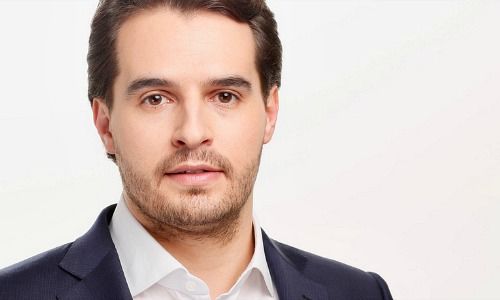Decentralization is one of the main reasons for Switzerland's sustainable success. The country puts emphasis on constantly trialling new concepts and models, writes Antoni Trenchev in his exclusive essay for finews.first.
finews.first is a forum for renowned authors specialized on economic and financial topics. The texts are published in both German and English. The publishers of finews.com are responsible for the selection.
News of the death of Switzerland as a cryptocurrency hub are exaggerated. While some companies are threatening to move to other jurisdictions such as Liechtenstein because of the decision of some Swiss banks to stop providing financial services to businesses dealing with virtual currencies, Switzerland still has a lot to offer. And it was heartening to see that the Swiss Financial Market Supervisory Authority (Finma) met recently with representatives of the country’s banking sector in the hope of changing their minds on excluding virtual currency dealing.
I believe there is still a bright future for Switzerland and cryptocurrencies. The hilly European country is already home to some of the industry’s leading players, including Xapo, Monetas, Metaco, the Ethereum Foundation and Nexo.
«The country’s economic minister said Switzerland should increase its interest in virtual currencies»
The «Crypto Valley», as the Swiss Canton of Zug has been dubbed, offers government support, infrastructure and a business-friendly environment. BlockShow recently named Switzerland as the most blockchain-friendly country in the world. Johann Schneider-Ammann, the country’s economic minister, said Switzerland should increase its interest in virtual currencies, moving from a «Crypto Valley» to a «Crypto Nation». This underlying political support is crucial to the future of crypto currencies.
There are, of course, many other factors that make Switzerland attractive. A tiny Western European country, Switzerland has become a policy-making role model with its decentralized governance system and political power spread across its 26 cantons.
Decentralization is one of the main reasons for the country’s sustainable success, making it arguably the world’s most democratic nation. Unlike many administrations, hell-bent on keeping the status quo, Switzerland puts emphasis on constantly trialling new concepts and models, a practice Swiss economist Robert Nef refers to as an «ongoing experiment».
«Switzerland ranks particularly high in terms of knowledge and technology outputs»
It is the combination of decentralisation and innovation that makes Switzerland such a perfect base for crypto currency players. According to the World Intellectual Property Organization (WIPO), which compiles an innovation index based on infrastructure, human capital and institutions, the country was first in the world with its innovation programme for seven consecutive years in 2017.
Switzerland ranks particularly high in terms of «knowledge and technology outputs». It has the highest ratio of patent applications per million inhabitants in Europe, more than double that of the Netherlands, which comes in second. If more proof of its innovative leadership were needed, the company behind the Swiss Stock Exchange, SIX, announced in July this year that it would build the world’s first fully-integrated digital asset trading platform.
«Nassim Taleb has described Switzerland as the most stable country in the history of mankind»
The words stable and Swiss seem to go hand in hand, and the stability of the Swiss financial environment is also a key factor in attracting the crypto industry. The best-selling author Nassim Nicholas Taleb has described Switzerland as «the most stable country in the history of mankind». Its neutrality, embedded in its political system, hugely successful banking and insurance industries, and strong national currency attract investment and business from all corners of the world. To guarantee stability and transparency in the crypto industry, the Finma has published specific guidelines on conducting an initial coin offering (ICO), thus becoming one of the first official bodies to formalise the process. Yet more evidence of its unconditional support.
Switzerland allows companies looking to provide a vital service to the crypto community a stable, forward-thinking, welcoming and efficient environment. The industry hopes to work alongside the existing financial community for many years to come, increasing its importance as a hub and contributing to its global fiscal growth.
Antoni Trenchev is a founder and managing partner of Zug-based Nexo. The comany provides instant crypto-backed loans to global clients, thus enabling the crypto community to retain ownership of their digital assets without selling when access to instant cash is needed. The Bulgarian citizen has been a crypto-enthusiast since 2011. As a Member of Parliament in his native country he has ferociously advocated and passed legislation for blockchain solutions on a variety of e-government services, most notably e-voting.
Previous contributions: Rudi Bogni, Peter Kurer, Oliver Berger, Rolf Banz, Dieter Ruloff, Werner Vogt, Walter Wittmann, Alfred Mettler, Peter Hody, Robert Holzach, Craig Murray, David Zollinger, Arthur Bolliger, Beat Kappeler, Chris Rowe, Stefan Gerlach, Marc Lussy, Nuno Fernandes, Richard Egger, Maurice Pedergnana, Marco Bargel, Steve Hanke, Andreas Britt, Urs Schoettli, Ursula Finsterwald, Stefan Kreuzkamp, Oliver Bussmann, Michael Benz, Peter Hody, Albert Steck, Andreas Britt, Martin Dahinden, Thomas Fedier, Alfred Mettler, Brigitte Strebel, Peter Hody, Mirjam Staub-Bisang, Nicolas Roth, Thorsten Polleit, Kim Iskyan, Stephen Dover, Denise Kenyon-Rouvinez, Christian Dreyer, Kinan Khadam-Al-Jame, Robert Hemmi, Anton Affentranger, Yves Mirabaud, Katharina Bart, Frédéric Papp, Hans-Martin Kraus, Gerard Guerdat, Didier Saint-Georges, Mario Bassi, Stephen Thariyan, Dan Steinbock, Rino Borini, Bert Flossbach, Michael Hasenstab, Guido Schilling, Werner E. Rutsch, Dorte Bech Vizard, Adriano B. Lucatelli, Katharina Bart, Maya Bhandari, Jean Tirole, Hans Jakob Roth, Marco Martinelli, Beat Wittmann, Thomas Sutter, Tom King, Werner Peyer, Thomas Kupfer, Peter Kurer, Arturo Bris, Frederic Papp, Claudia Kraaz, James Syme, Peter Hody, Claude Baumann, Dennis Larsen, Bernd Kramer, Ralph Ebert, Marionna Wegenstein, Armin Jans, Nicolas Roth, Hans Ulrich Jost, Patrick Hunger, Fabrizio Quirighetti, Claire Shaw, Peter Fanconi, Alex Wolf, Dan Steinbock, Patrick Scheurle, Claude Baumann, Sandro Occhilupo, Claudia Kraaz, Will Ballard, Michael Bornhäusser, Nicholas Yeo, Claude-Alain Margelisch, Jean-François Hirschel, Jens Pongratz. and Samuel Gerber and Philipp Weckherlin, Michel Longhini, Anne Richards and Michael Welti.


































